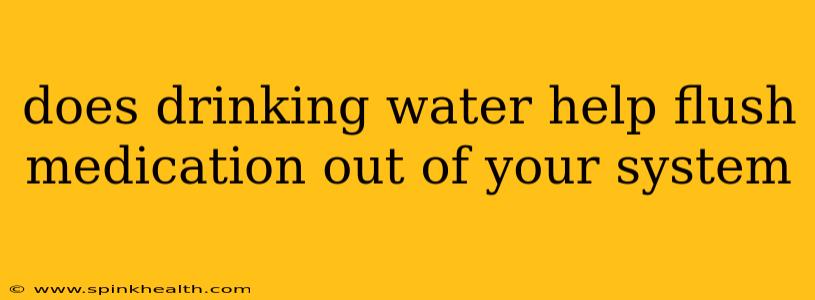Does Drinking Water Help Flush Medication Out of Your System? The Truth About Hydration and Drug Elimination
The quick answer? While drinking plenty of water is crucial for overall health, it doesn't magically "flush" medication out of your system faster. It's a common misconception, often fueled by well-meaning but inaccurate advice. Let's delve deeper into the reality of how your body processes medication and the role hydration plays.
Imagine this: you've taken a medication, perhaps an over-the-counter pain reliever or a prescription drug. Your body, a marvel of intricate biological processes, begins its work. The medication is absorbed, travels through your bloodstream, reaches its target site (where it does its job), and then...it needs to be eliminated. This elimination process is primarily handled by your liver and kidneys, not by the sheer volume of water you consume.
How Your Body Eliminates Medication
Your body uses several methods to eliminate medication, and these methods are highly specific to the drug itself. Factors like the drug's chemical makeup, dosage, and even your individual metabolism all contribute to how quickly it's processed and removed. The primary routes are:
-
Metabolism in the Liver: The liver plays a crucial role, breaking down medications into smaller, less active metabolites. This metabolic process is complex and highly individual.
-
Excretion via Kidneys: After metabolism, many medications and their metabolites are filtered out by your kidneys and excreted in your urine. This is where hydration plays a subtle but important role.
-
Other Routes: Some medications are also eliminated through sweat, feces, and even breath.
Does Hydration Affect Medication Elimination? The Nuances
Now, back to water. While drinking water doesn't directly "flush" drugs out, adequate hydration supports the kidney's function in filtering waste products, including medication metabolites. Think of your kidneys like a highly efficient filter; sufficient water helps maintain its optimal performance. Dehydration, on the other hand, can impair kidney function and potentially slow down the elimination process.
Therefore, maintaining proper hydration is beneficial for overall health and indirectly supports your body's natural process of eliminating medications. But it's not a substitute for proper medical advice or a way to speed up elimination significantly.
What About Specific Medications?
This is where the "it depends" comes in. Some medications are explicitly designed to be water-soluble, meaning they are easily dissolved and excreted in urine. For these medications, sufficient hydration might help with elimination, but the effect is marginal compared to the liver's and kidneys' primary functions. Other medications are fat-soluble and are metabolized and eliminated much more slowly.
Can Drinking Excessive Amounts of Water Speed Up Medication Elimination?
No. Drinking excessive amounts of water can be harmful and lead to a dangerous condition called hyponatremia (low sodium levels in the blood). This is far more dangerous than the slightly slower elimination of medication in a dehydrated state.
What Should I Do If I'm Concerned About Medication Elimination?
Always follow your doctor's or pharmacist's instructions regarding medication use. If you have concerns about a specific medication, reach out to your healthcare provider. They can provide personalized advice based on your health status and the medication you're taking. Never attempt to manipulate your medication elimination without professional guidance.
In Conclusion
While adequate hydration is essential for overall health and indirectly supports kidney function in eliminating medication metabolites, it's not a method to "flush" medications out of your system. The process is complex and depends on many factors, including the medication itself and your body's metabolism. Always consult with a healthcare professional if you have questions or concerns about medication.

